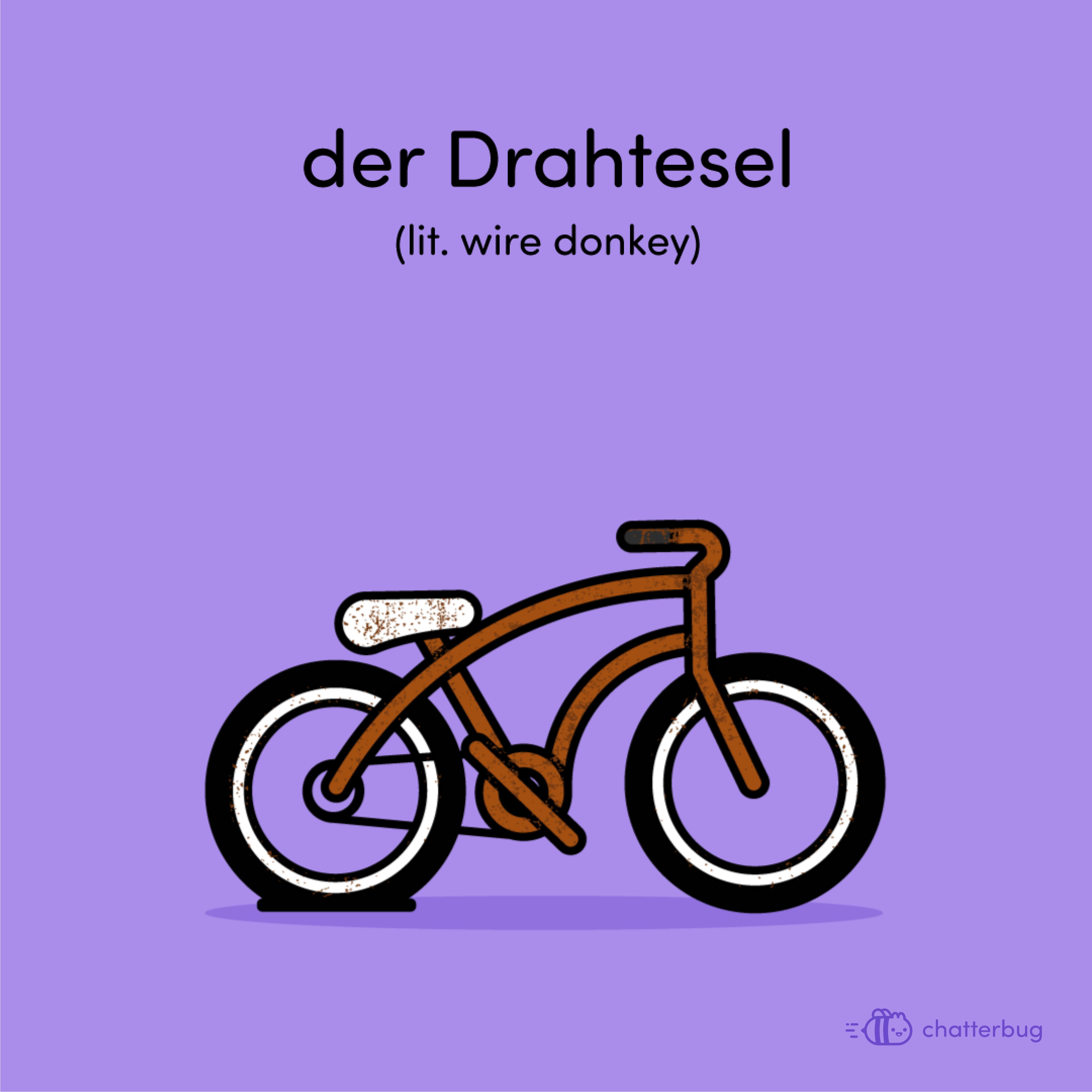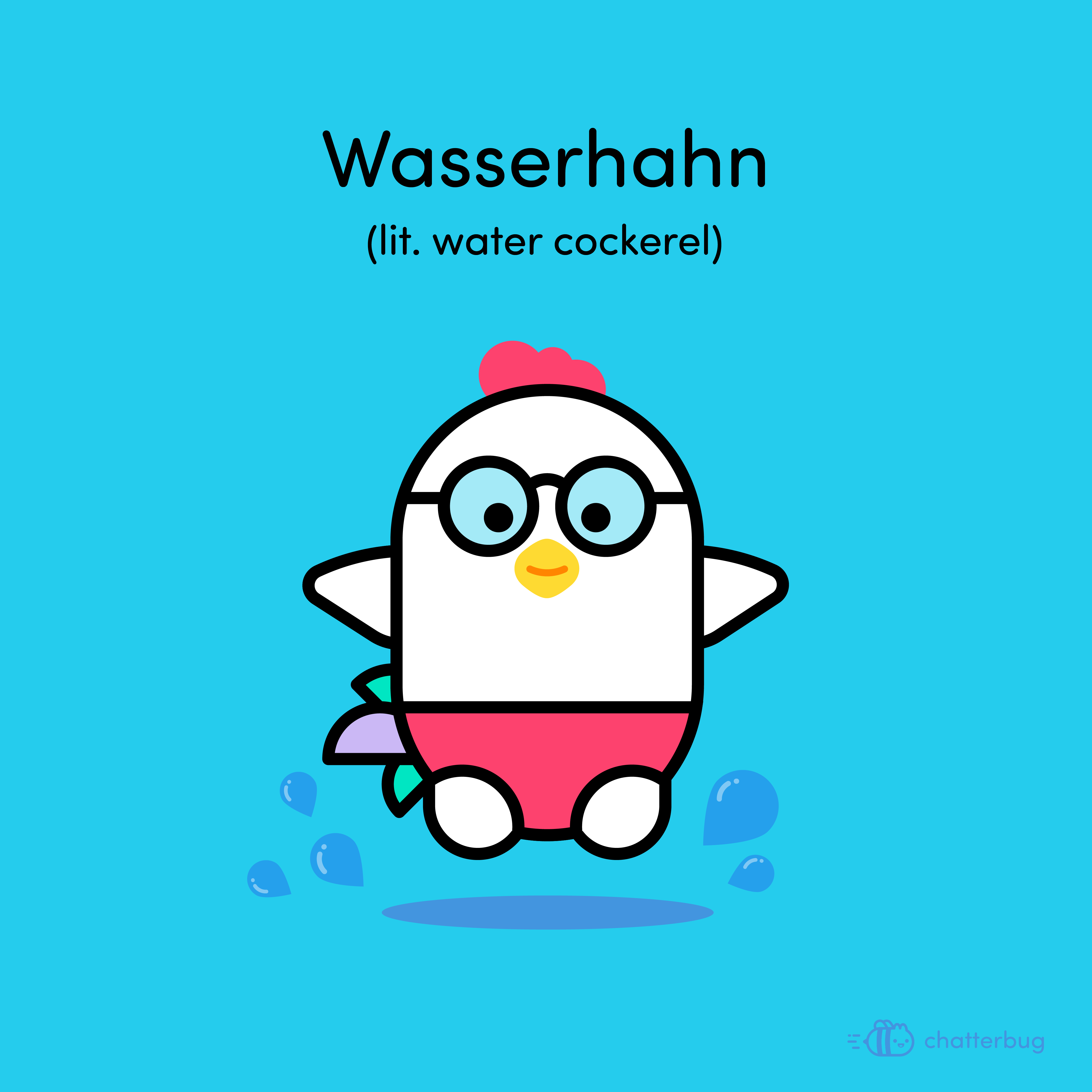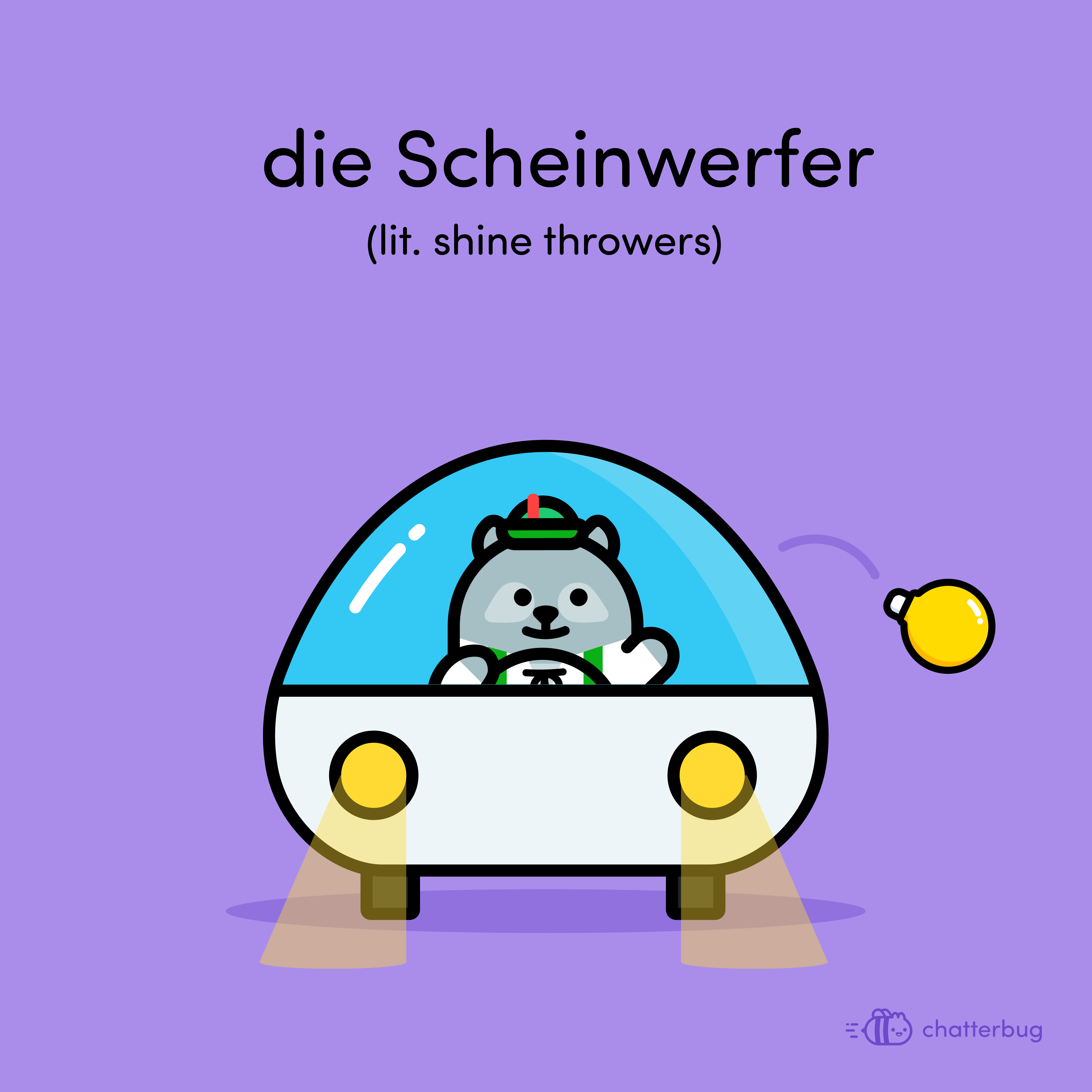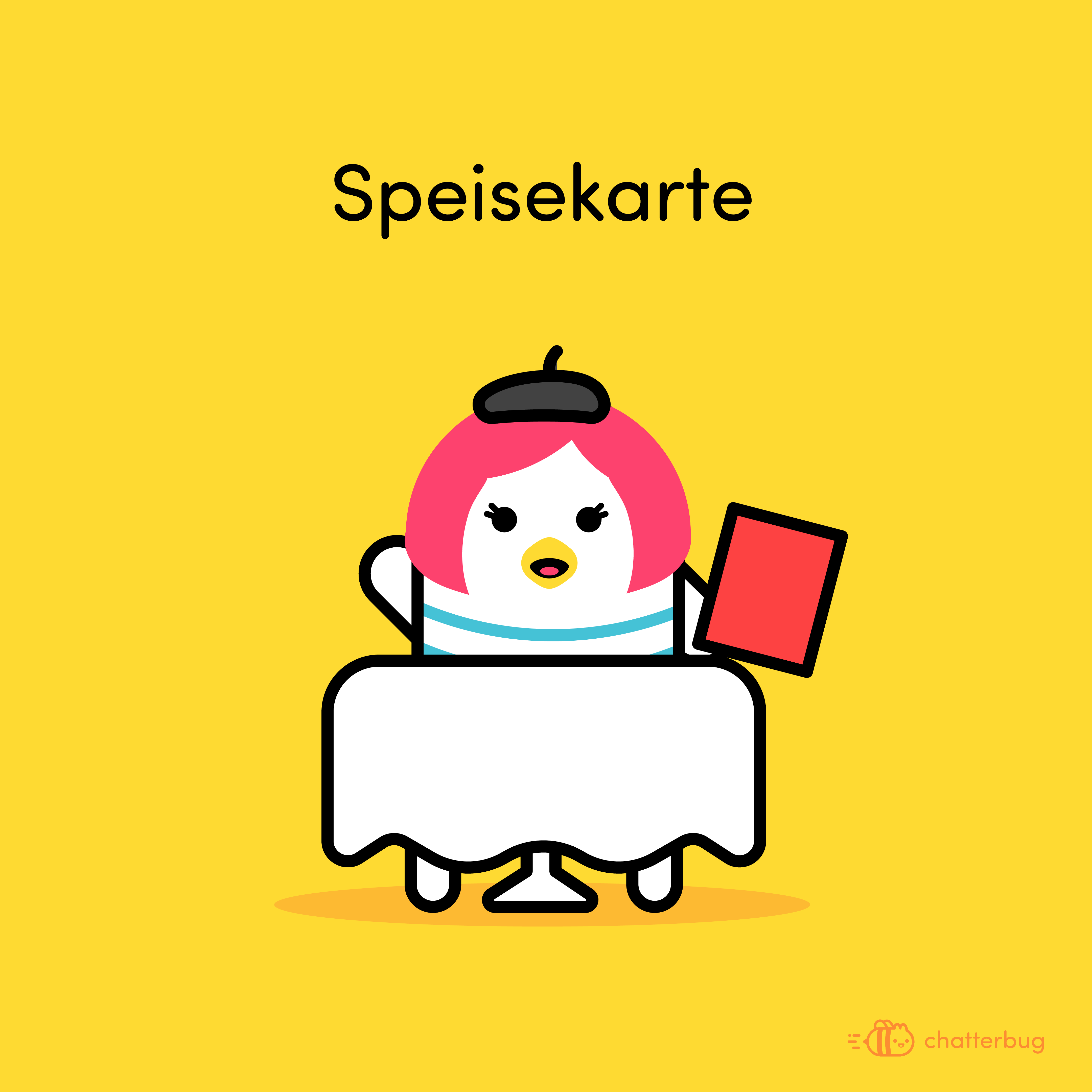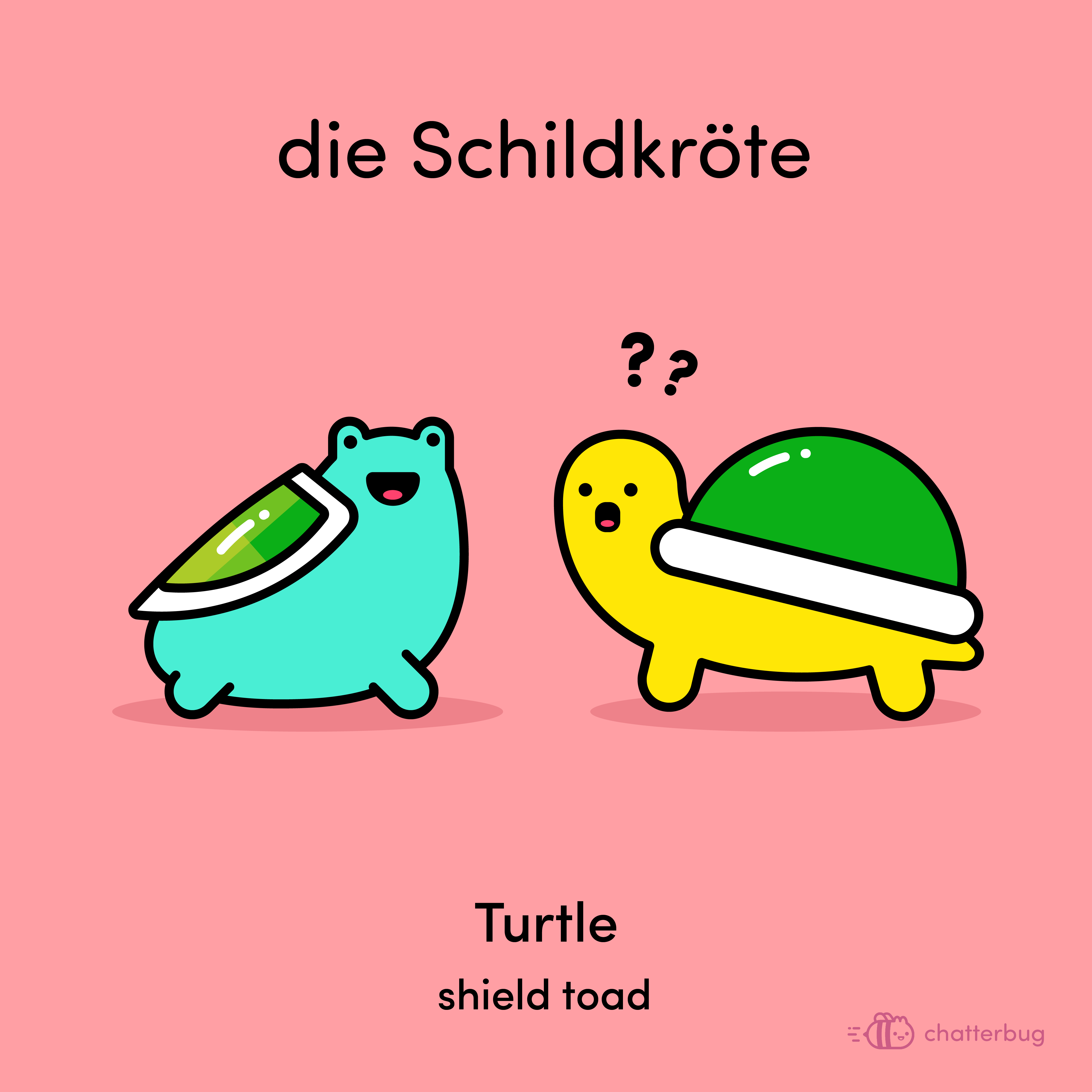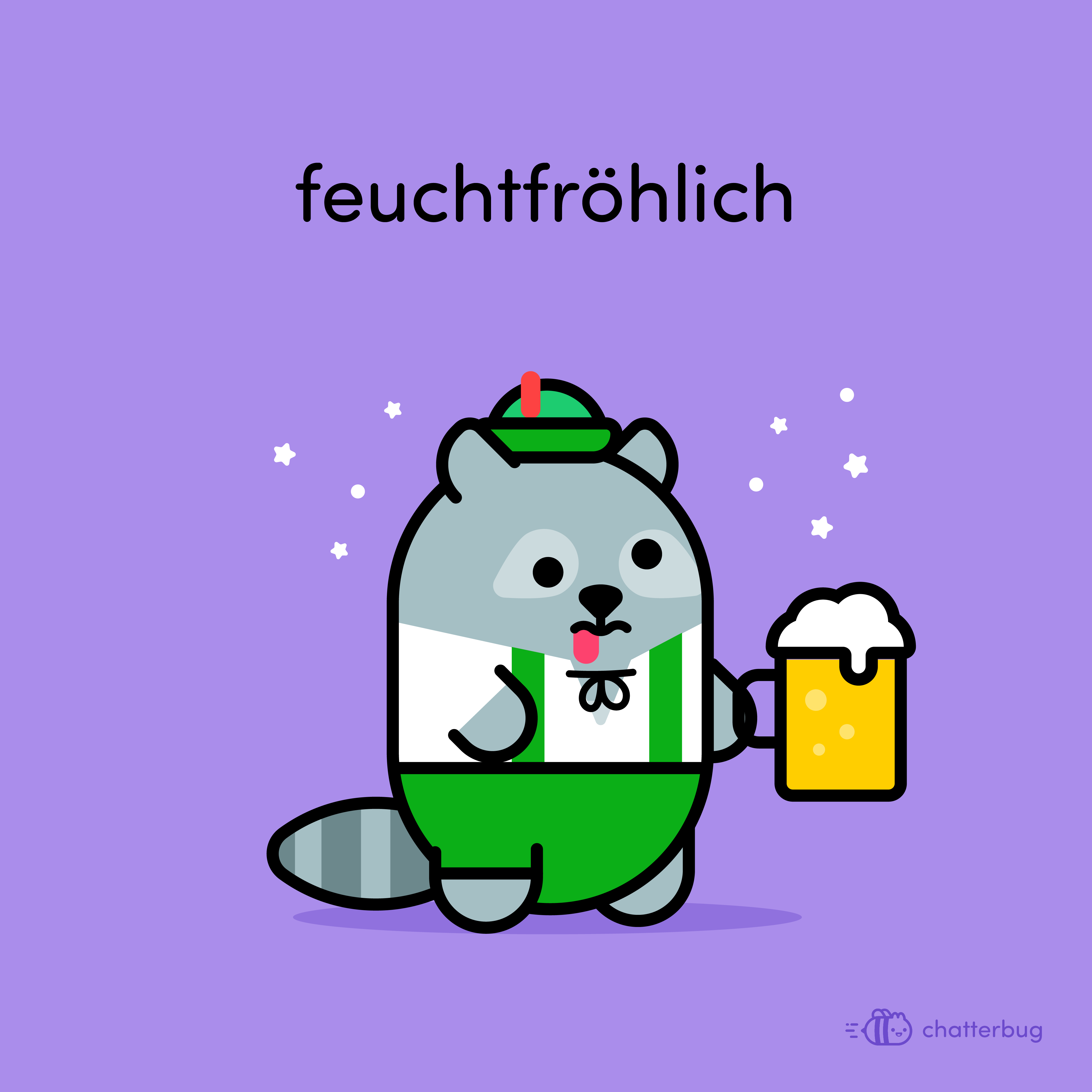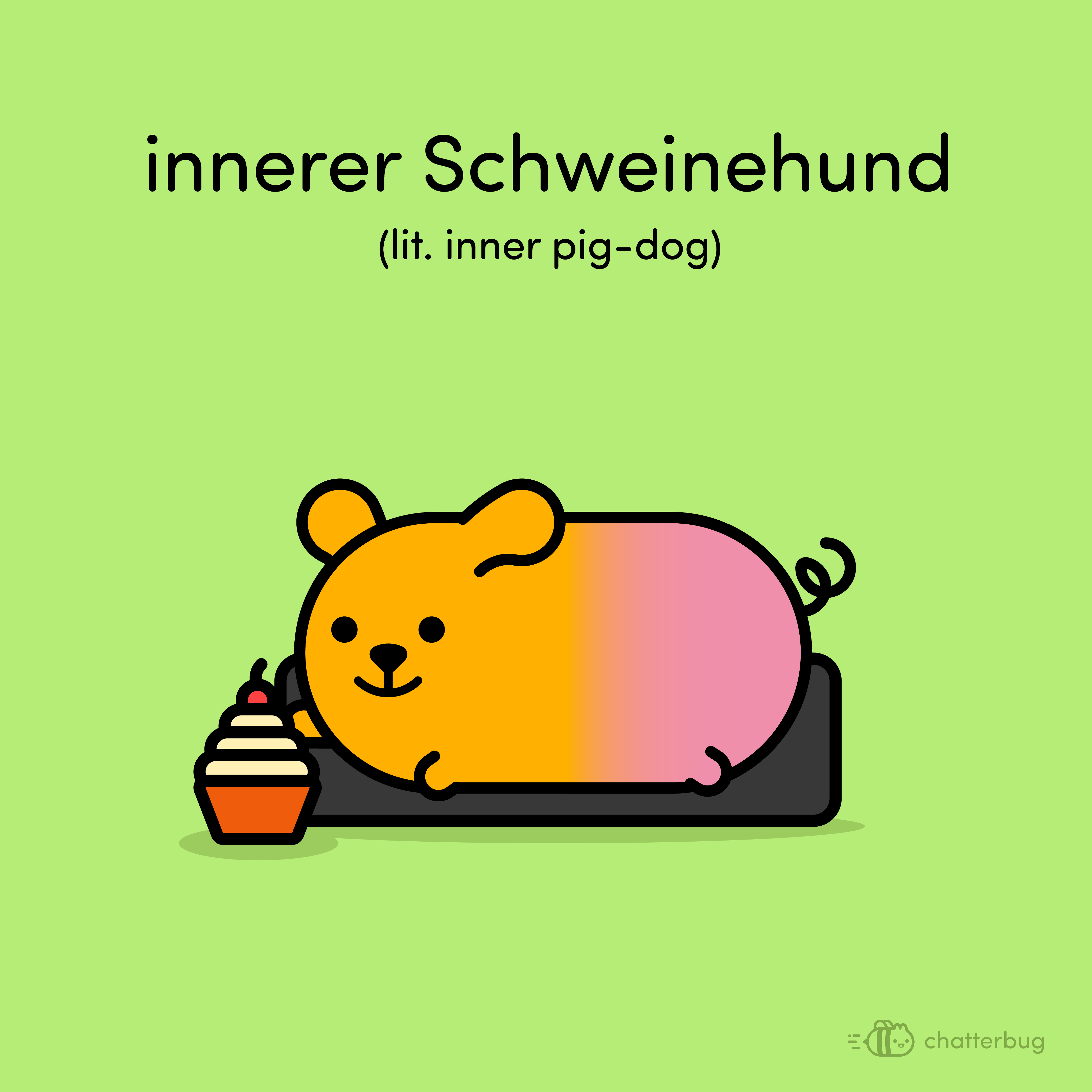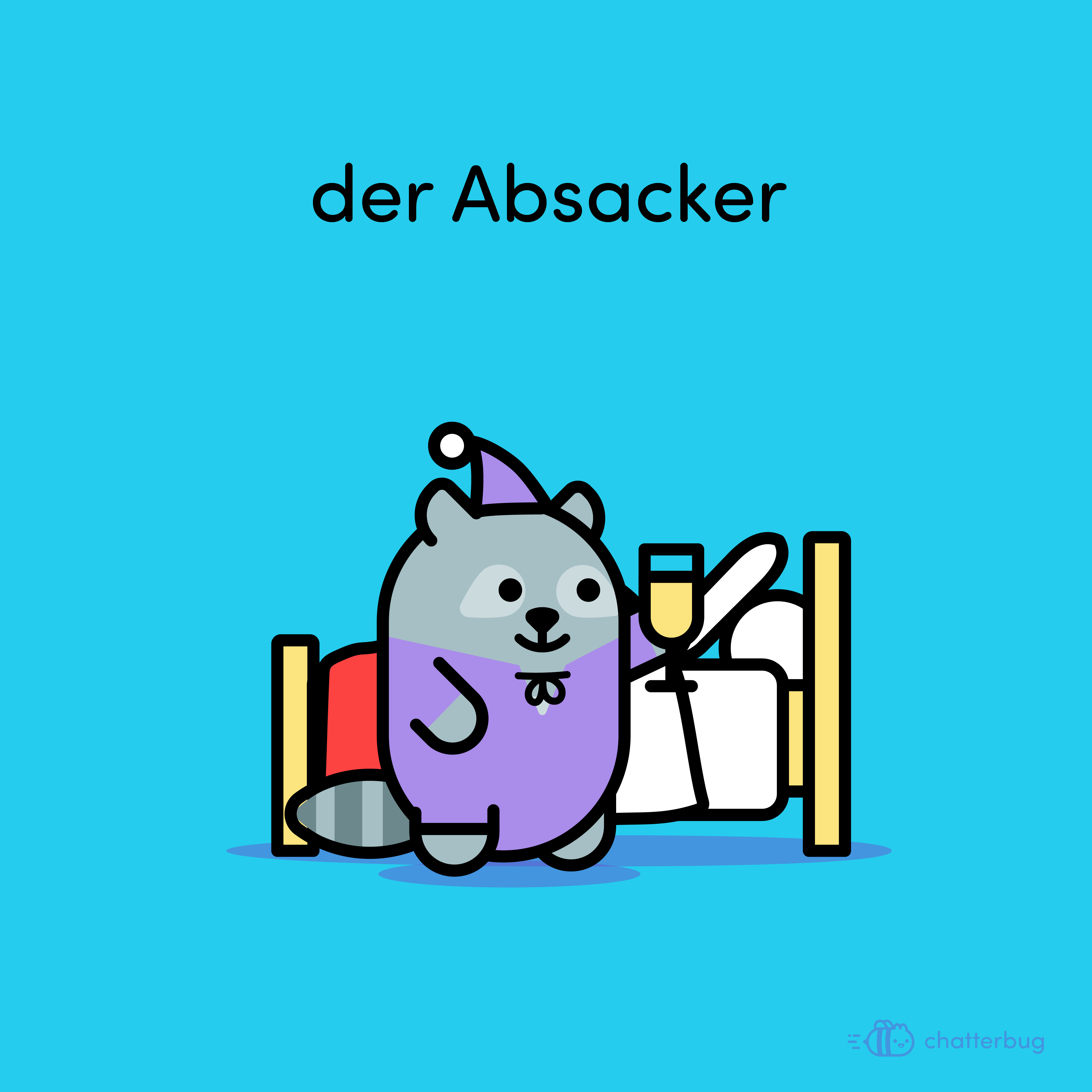
By
Last updated:
November 11, 2022
Many German words have no close translation in English.
One of the greatest things about learning languages is to discover words which exist in one language but don’t have any equivalent in your own—or any other for that matter.
Here we we’ll check out 23 funny, weird and unique German words you’ve probably never heard of!
Contents
- Funny German Words
-
- 1. Purzelbaum (tumble tree)
- 2. Schnapsidee (booze idea)
- 3. holterdiepolter (helter-skelter)
- 4. Scheinwerfer (shine-throwers)
- 5. Wildpinkler (wild urinator)
- 6. Ohrwurm (ear worm)
- 7. Kummerspeck (grief bacon)
- 8. innerer Schweinehund (inner pig dog)
- Weird German Words
-
- 9. Fremdschämen (external shame)
- 10. Torschlusspanik (closing-gate panic)
- 11. Weichei (soft egg)
- 12. Erklärungsnot (explanation poverty)
- 13. Backpfeifengesicht (slap face)
- 14. Sitzfleisch (seat meat)
- 15. Zungenbrecher (tongue breaker)
- 16. Schattenparker (shadow parker)
- Unique German Words
-
- 17. Fernweh (distance pain)
- 18. Kaffeeklatsch (coffee gossip)
- 19. Treppenwitz (staircase joke)
- 20. Lebensmüde (life tired)
- 21. Weltschmerz (world pain)
- 22. Dreikäsehoch (three cheeses high)
- 23. Kuddelmuddel (???)
Download:
This blog post is available as a convenient and portable PDF that you
can take anywhere.
Click here to get a copy. (Download)
Funny German Words
1. Purzelbaum (tumble tree)
Despite the name, a Purzelbaum isn’t part of the kingdom of plants.
Instead, it describes a somersault on the ground, a favorite way of children to get their clothes dirty.
2. Schnapsidee (booze idea)
This directly translates to “booze idea.” This is along the same lines of the English “hold my beer.”
In other words, it’s a silly or stupid idea that would probably only sound great to a drunk person.
3. holterdiepolter (helter-skelter)
This word sounds just as silly in English as it does in German. Holterdiepolter means “helter-skelter,” or in a hurry.
But not just any hurry— a “helter-skelter” is a very chaotic and messy kind of hurry. The kind where you’re probably confused and clumsy.
4. Scheinwerfer (shine-throwers)
The direct translation of this word is rather amusing: “shine-throwers.”
This word is used to reference car headlights, which makes sense since they do, in fact, throw shine.
5. Wildpinkler (wild urinator)
This one is sure to make you giggle, as it literally means a wild urinator.
Not only does this refer to someone that is willing to go to the bathroom outside, but is also often used in a derogatory way to call a man weak.
6. Ohrwurm (ear worm)
Have you ever listened to a song on the radio while driving to work only to find yourself still humming the same tune by lunch time? Congratulations, you’ve had an ear worm.
The beautiful German word Ohrwurm describes the fact of having a song stuck in your head as if it wriggled itself into your brain through your ear.
7. Kummerspeck (grief bacon)
When a relationship ends or during other times of sadness, anger, or worry, it’s common to put on a few pounds of Kummerspeck.
This is the excess weight put on by emotional overeating. So when you find yourself on the couch watching rom-coms with a tub of ice cream, you are in fact feeding your grief bacon.
8. innerer Schweinehund (inner pig dog)
Can’t get up in the morning to be on time for work? Too lazy to go to the gym? Homework remains undone until the last minute?
Don’t worry, the blame lies with your inner pig dog. That’s the tiny voice in the back of your head which is trying to convince you to live the slow life and ignore any responsibilities.
Weird German Words
9. Fremdschämen (external shame)
For those of you who cringe in phantom pain when others make a fool of themselves, this is your word.
It describes the feeling of shame when seeing someone else in an uncomfortable or embarrassing situation.
In English, we’d call this “second-hand” or “vicarious embarrassment.”
10. Torschlusspanik (closing-gate panic)
As people get older, some find themselves worrying about roads not taken or milestones they meant to achieve by a certain age but haven’t.
Torschlusspanik is the feeling of urgency to accomplish them before some imaginary gate closes and “it’s all too late.”
It’s mostly used for those who sense their biological clock is running out and feel the need to settle with a partner or have children immediately.
11. Weichei (soft egg)
No, Weichei isn’t what you order in the hotel when you want a three-minute egg for breakfast. In fact the waiter might look at you slightly disconcerted for accusing him of being a wuss.
A soft egg, in German, means someone who is weak and cowardly. The same is also conveyed by calling someone Würstchen, the diminutive of sausage.
12. Erklärungsnot (explanation poverty)
Erklärungsnot is a state shared by cheating spouses, lying politicians, and school children without their homework.
It’s what you find yourself in when put on the spot without a sufficient explanation or excuse for something you have done or failed to do. It’s often used when a public figure is going through a PR crisis.
13. Backpfeifengesicht (slap face)
Have you ever heard the joke “Some people just need a high five – in the face – with a chair?”
Backpfeifengesicht has a similar connotation. It describes someone who you feel needs a slap in the face.
14. Sitzfleisch (seat meat)
As much as it sounds like it, Sitzfleisch isn’t a recipe of German Hausfrauen that involves tenderizing meat by placing it under your buttocks. Instead, it describes a character trait.
Those who possess a lot of seat meat are able to sit through and weather something incredibly hard or boring.
15. Zungenbrecher (tongue breaker)
While it sounds like a medieval torture instrument, the nature of the Zungenbrecher is much less gruesome.
It is the German equivalent of tongue twister, a phrase that’s very hard to pronounce even for native speakers due to its sequence of letters.
A very common one in German is Blaukraut bleibt Blaukraut und Brautkleid bleibt Brautkleid (red cabbage remains red cabbage and a wedding dress remains a wedding dress).
Yeah, try saying that one 10 times fast.
16. Schattenparker (shadow parker)
This word is part of a series of insults for men which accuse them of unmanly behavior.
In this case, Schattenpaker accuses one of parking their car in the shadow to avoid heating up the interior.
These kinds of derogatory terms were something of a meme some years back and whole lists of them exist on the internet.
Alternatives include Warmduscher (someone who showers with warm water), Sitzpinkler (a man who urinates while sitting down), or Turnbeutelvergesser (someone who used to forget their gym bag in cardio class).
Unique German Words
17. Fernweh (distance pain)
This gem describes a longing to be elsewhere.
It’s kind of like a reverse homesickness (Heimweh in German), a longing for a place that isn’t where you are right now.
Fernweh is a frequent reason for people in Germany to go on holiday.
18. Kaffeeklatsch (coffee gossip)
This cute little word is what you’d use to say you’re meeting someone for coffee and conversation.
19. Treppenwitz (staircase joke)
Have you ever noticed how when you have a chance encounter with an attractive person or get into an argument with someone, the best jokes, lines, and comebacks always occur to you afterwards?
That’s the so-called Treppenwitz. It’s the joke that comes to your mind on the way down the stairs after talking to your neighbor in the hallway two floors up.
20. Lebensmüde (life tired)
This word literally means being tired of life and was used to describe the dramatic and soul-crushing emotional agony of young Romantic poets.
Nowadays, lebensmüde is what you call your friends when they are attempting something especially stupid and possibly life threatening.
21. Weltschmerz (world pain)
The world isn’t perfect. More often than not it fails to live up to what we wish it was.
Weltschmerz describes the pain we feel at this discrepancy.
22. Dreikäsehoch (three cheeses high)
This sounds like it would make a great name for a pizza. What it actually describes is a person who is vertically challenged, implying they’re only as tall as three wheels of cheese placed on top of each other.
Usually this label is reserved for small children.
23. Kuddelmuddel (???)
I know, great final word right? Don’t even start guessing its English meaning.
Kuddelmuddel describes an unstructured mess, chaos, or hodgepodge. Was für ein Kuddelmuddel! (what a hodgepodge)
If you’re struggling to understand a word, watching or listening to them in use can make the meaning much clearer.
Try immersing yourself in German content to really help you to learn the context of each word.
For example, with a program like FluentU you can watch authentic German videos or create personalized flashcards to study new words and phrases with.
Other ways to easily immerse yourself can be through watching TV shows or movies in German. Having a storyline to follow can make a word much easier to understand.
Keep practicing and soon you’ll sound just like a native would!
Download:
This blog post is available as a convenient and portable PDF that you
can take anywhere.
Click here to get a copy. (Download)
Table of contents
- 10 weird German words
- 10 Funny German Words with literal translations
- 5 German words that only exist in German
10 weird German words
Like any language, German has its own strange and peculiar words and phrases. Here are ten weird German words and their meanings:
Ohrwurm (ear worm)
This German word refers to having the melody and/or lyrics of a song stuck in your head for an extended period. Anybody who has ever experienced this can attest to just how annoying the Ohrwurm can be.
Weichei (soft egg)
In German, a «soft egg», means someone who is a coward or weak-minded – they’ll just go with the crowd or what is easy instead of standing up for what they think is right, but with the right person and intent, it can have a lighter, more humorous meaning.
Backpfeifengesicht (slap face)
Backpfeifengesicht describes someone who you feel needs a slap in the face. You may want to be careful if and when you use this one: it’s best used among good friends unless you’re wanting to cause tension!
Erklärungsnot (explanation poverty)
Erklärungsnot describes the state you might find yourself in when no excuse will get you out of the trouble you’re in. No sufficient explanation for not doing your homework or lying to your wife? That’s Erklärungsnot.
Purzelbaum (tumble tree)
Every child in Germany knows all about this one. It may sound like it’s part of the plant kingdom, but, a Purzelbaum describes a somersault on the ground, often landing in the dirt and usually resulting in dirty knees.
Zungenbrecher (tongue breaker)
Zungenbrecher is much less gruesome than it sounds. It means «tongue twister» or a phrase that’s very hard to pronounce due to its sequence of similar sounding letters. A very well-known one is: Blaukraut bleibt Blaukraut und Brautkleid bleibt Brautkleid. Can you say it ten times, quickly?
Schattenparker (shadow parker)
This is actually an insult for men who are seen to be engaging in unmanly behavior; for example looking for shaded parking, according to the literal translation. Similar in meaning, a Warmduscher is someone who showers with warm water.
Kuddelmuddel (muddled mess)
Kuddelmuddel describes mess, chaos, or hodgepodge arrangements or scenes. Clever alternatives which mean the same include Tohuwabohu, Wirrwarr, Mischmasch, and Kladderadatsch
Luftschloss (air castle)
This refers to an impossible or unrealistic dream — like building a castle in the air — and is used to describe that which, sadly, just cannot be achieved.
Kopfkino (head cinema)
The word Kopfkino refers to mentally playing out an entire scene in your mind, as if in a movie theater.
10 Funny German Words with literal translations
Here is a list of funny German words that have all-too amusing literal translations and their meaning:
Speisekarte (dish card)
This is the German word for a menu and is a simple, widely used German word that is easy to learn and repeat as you travel through Germany, enjoying some of the country’s gastronomic delights.
Eselsbrücke (donkey’s bridge)
The word Eselsbrücke has nothing to do with donkeys and everything to do with mnemonics. A mnemonic helps you to remember information; for example, «Now We Shall Eat» may help you remember the directions North, West, South and East on a compass. Kummerspeck (Grief Bacon)
Kummerspeck (gaining weight from comfort eating)
This one refers to the weight one might gain after a bad relationship break up. This may be one of the strangest literal German/English translations there is.
Innerer Schweinehund (inner pig-dog)
If you never sort out your cupboards or are always too lazy to go to the gym, it’s the fault of your innerer Schweinehund or inner pig-dog. This is your disorganized inner voice (who is, in your defense, fully accountable).
Fremdschämen (exterior shame)
Cringing in phantom pain or shame when others make a fool of themselves is known as Fremdschämen to Germans. Painful though it might be, you can’t be accused of lacking empathy.
Torschlusspanik (closing-gate panic)
Torschlusspanik is the feeling of panic as time runs out.
Treppenwitz (staircase joke)
If the best line, joke, or comeback always occurs to you after speaking to someone who needed to hear it, that’s Treppenwitz. It’s usually a snappy comeback that comes to your mind on the way out of the door, after you’ve finished speaking.
Lebensmüde (life tired)
This describes the feeling of being utterly done with it all: beaten down and tired of everything or weary and gloomy about the whole world.
Be careful: In some cases, this word can also have a suicidal meaning. So, if you decide to use Lebensmüde, make sure people understand you correctly.
Dreikäsehoch (three cheeses high)
This is a (hopefully humorous) way to describe a person who is lacking in height, implying they’re the approximate height of three wheels of cheese placed on top of each other. Often (and, again, hopefully), this term is reserved for small children.
Sitzfleisch (sit or seat meat)
If you possess ample seat meat, you are able to sit through hard or boring meetings, parties or speeches — basically because you carry your own cushion or «seat meat».
Words in German
You may find that some words which only exist in German perfectly describe situations or moods that cannot be expressed so well in your mother tongue… so why not introduce your non-German-speaking friends and family to these phrases?
5 German words that only exist in German
Some words are unique to the German language. See these and exemplifying the original thinking and culture of the German nation:
1. Schnapsidee
This is a quirky German word that means, «schnaps idea» or «booze idea». It’s often used to indicate an idea so incredibly stupid, unwise, or pointless that it’s originator must be slightly (or very) inebriated. It’s generally used to refer to any idea that seems foolish, stupid or improbable.
2. Weltschmerz
Weltschmerz or «world pain» is used to sum up a feeling of melancholy due to unknown reasons. In short, sadness even when everything is going well.
3.Verschlimmbesserung
If you tried to comfort yourself with ice-cream and it fell on the ground, it can only be described as Verschlimmbesserung. While this German word doesn’t have a simple literal translation, it describes an attempt at improving a bad or hopeless situation, but this attempt only makes things worse.
4. Fernweh
Fernweh describes the feeling of wanting to be somewhere else. Fernweh is not quite homesickness, but more a longing for a distant place, the best remedy being, probably, a vacation.
5. Zeitgeist
Simply put, Zeitgeist, which is now often used in English too, refers to the mood of contemporary culture and society or an understanding of the «spirit of the times».
Find your perfect match
Search by city, major, or field of study, and find your dream study program in Germany.
Find a course
Want to study in Germany?
Learn valuable tips on applying to a German university, details on securing your student visa, and much more on our guide.
Do you know that feeling when you want to express yourself with a specific word but that word doesn’t exist in your language?
It can be quite disappointing.
Imagine how nice it would be if you could describe your feelings in one word, one single word.
That’s why language learners are in advantage. Perhaps that specific word doesn’t exist in your native language but it might exist in another language.
Despite popular opinion, German is very interesting and expressive. It has a lot of words that other languages don’t.
German is also a very clever language because it can fill many gaps and explain many feelings or things that English can’t.
On top of that, there are a lot of funny German words that will be our topic today.
Today, we’ll share with you our favorite funny words in German.
Let’s dive in.
Funny German Words
This language is full of funny German phrases.
Since the words are quite long, take your time and read them slowly.
The most important thing, don’t forget to enjoy it!
1. Backpfeifengesicht
The ideal translation for this word is ‘slap face.’
The word describes that person who starts talking and you immediately want to slap them in the face.
It can be someone from your work who always steals your lunch, or perhaps that annoying friend who thinks it’s amusing to use some awful words or slang.
However, be careful when you say this word. Use it only with your close friends and with those who won’t be mad.
2. Erklärungsnot
This word can be explained as a lame excuse for something that you’ve done or failed to do. The situation requires you to give a proper explanation but you only come up with some excuse that no one believes.
For example, when you are caught in the middle of eating the cake-cream, and you have less than a second to think of a good explanation.
Therefore, it can be translated as a ‘poverty of explanation.’
3. Feierabend
Translated as ‘the reason to celebrate,’ this word should exist in every language in the world.
Imagine the following situation: it is Friday afternoon, and you’ve done all your work. You came home, and you have all day and weekend just for yourself.
So you get cozy, grab a juice, cola or beer and put some music on. Sounds perfect, doesn’t it? Well, it is ‘feierabend.’
4. Fernweh
This word is similar to nostalgia but has a wider meaning. It describes the feeling when you want to be somewhere else. It doesn’t mean that you are homesick, quite on the contrary.
It can refer to some distant places or cities.
For example, you can use ‘fernweh’ when you’re not able to go on a vacation somewhere.
5. Fremdschämen
On one hand, this word is used to express empathy for someone. On the other hand, it can describe some situations that are awkward and humiliating.
For example, you went on a date. Your partner is so boring that you can’t wait for the night to be over. However, he’s having a great time especially because he is trying to talk about his experiences that are so awkward that you feel ashamed instead of him. That is why the ‘fremdschämen’ is an ideal explanation for this situation.
6. Frühjahrsmüdigkeit
Perhaps in English, the best explanation for this word is ‘spring fatigue.’ However, it is more than that.
This word describes a temporary mood, laziness, and physical condition that happens to people in March and April when the spring comes. At this time, people experience low energy and weariness, some even have headaches, aching joints, and a lack of motivation to do anything.
7. Geboregenheit
We should all use this word even if we don’t speak German.
It’s used in situations when you have to be completely present in a moment to fully enjoy it.
In other words, it’s an experience of happiness or feeling of satisfaction with a certain situation. It’s a state of comfort and well-being.
8. Honigkuchenpferd
If you wanted to say this in English, you would have to use a whole sentence instead.
However, In German, ‘honigkuchenpferd’ is enough.
It’s a situation when you get embarrassed in front of someone very important, and your face shows all your emotions and expressions, including embarrassment.
9. Innerer Schweinehund
Picture this. It’s early in the morning. Your alarm goes off, but you simply don’t have the energy to get up and start preparing for work.
Or perhaps another situation: you had enough time to do your homework, but you are postponing it until the last moment when you have to do it. You are too lazy to do it and chilling on the sofa seems like a much better solution.
That voice in your head, telling you that it’s better to continue sleeping or relaxing, that is ‘innerer schweinerhund,’ literally translated as ‘inner pig dog.’
10. Jein
This word can be translated as ‘yes and no’ simultaneously.
That stereotype about strict Germans is not so true which is seen in this example.
Admit it! There are plenty of occasions when you just want to say ‘jein.’
11. Kuddelmuddel
If you thought that this meant to cuddle, you are very wrong. This word has nothing to do with cuddling. On the contrary, it describes a chaotic state or a mess.
For example, when you enter your kids’ room, it is so messy that the only thing you can say is ‘kuddelmuddel.’
The word consists of ‘kuddel,’ from ‘koddeln,’ which means ‘dirty linen,’ and the word ‘muddel’ that means ‘mud.’
12. Lebensmüde
There are situations when many of us are tired of everything gloomy around us. Even though ‘lebensmüde’ expresses this feeling perfectly, you have to be careful you use it because it can sometimes have suicidal meaning. So, before you use the word ‘lebensmüde,’ make sure that you are being understood correctly and clearly.
13. Schadenfreude
The pleasure gained from other people’s misfortune can be expressed in German as ‘schadenfreude.’
It can be a situation at work. A colleague of yours got a promotion instead of you, and they never miss the opportunity to emphasize that. You are happy for them, but you are actually a little bit jealous. And then something terrible happens to them. They are devastated. But you, you feel ‘schadenfreude.’ You are content that they are not entirely happy.
14. Schnapsidee
You’ve surely had situations when you’ve thought of some crazy idea, which later appeared to be a stupid one. Like you were drunk while that idea came to your mind. So, in a moment when an idea like this comes to your mind, this is a ‘schnappsidee,’ literally ‘crazy idea.’
15. Sitzfleisch
The ‘seat meat’ in English probably sounds, well, quite strange.
In German, however, it describes someone’s character trait. The person who is ‘sitzfleisch’ can go through anything boring, or very hard.
It’s like that person can be productive for a long time or can do anything they are asked to do, even in difficult situations.
16. Sturmfrei
Adults remember that feeling (probably with nostalgia) when they couldn’t wait for their parents to go somewhere so that they can have the whole house for themselves. In German, it can be described with only one word, ‘sturmfrei.’
17. Torschlusspanik
The feeling of panic as time runs out can be explained with one German word: ‘torschlusspanik, ’ or in English, ‘closing door panic.’
You can use this word in situations when you, for example, start panicking because the time goes by quickly.
It’s a feeling of missing out on a chance to do something greater, better. You’re afraid that the time will pass and that it will be late to do something you could do.
18. Tote Hose
If you want to translate the phrase ‘dead trousers’ from English to German, you get some completely ordinary one in German, ‘tote hose.’ However, this expression is anything but ordinary. It’s used in situations when you feel intense boredom, the moment when time stands still, when nothing happens, and when it seems like it will never end.
19. Verschlimmbesserung
Yes, this is a pretty long word. But compared to other German words, it’s average. The word ‘verschlimmbesserung’ is used in situations when something bad happens, or you’ve said something that appeared to be wrong and now you regret it.
But instead of trying to ‘repair the damage,’ you are digging the hole deeper and deeper. In one word, it’s ‘verschlimmbesserung.’
This word can literally be translated as ‘fixing something to be worse than it is.’
20. Waldeinsamket
It’s literally ‘the feeling of being alone in the woods.’
This feeling is a synonym for enjoying alone time peacefully, ideally surrounded by nature. You achieve some level of meditation and feel fulfilled and happy.
Long German Words
We couldn’t miss out on the beauty of long German words, so we had to mention the longest one.
Here’s the winner.
Donaudampfschiffahrtselektrizitätenhauptbetriebswerkbauunterbeamtengesellschaft
This word is a perfect practice for pronunciation, like a tongue-twister.
Do you like tongue-twisters?
They are quite useful for mastering your pronunciation. Check out these
10 German tongue twisters to improve your accent.
This word is not a mistake. And yes, it has 79 letters.
Here’s what it means.
‘Association for Subordinate Officials of the Head Office Management of the Danube Steamboat Electrical Services’
Conclusion
These words are just one part of the wonderful German language.
We tried to explain them to you in English, but that’s the beauty of languages
They are all unique and there’s a lot of words that can’t be translated. That is why there are many
German words in English we use every day, such as hamburgers, fest, or wanderlust.
Have you started learning German yet?
What’s the funniest German word in your opinion?
Let us know in the comments below!
Funny German words? Germans can actually be funny? Are you sure?
Germans are usually seen as very strict and sincere people. But that’s wrong! It probably is a misinterpretation of some other qualities attributed to Germans, such as discipline, punctuality and an obsession with details.
Some of these might be true, but being on time doesn’t mean you can’t have a laugh. (In fact, in comedy the timing of jokes is crucial!) Germany has a big comedy scene and a long tradition of political cabaret. And there’s many popular fairs like the Karneval in the Rhine area or the Octoberfest in Bavaria, where people really let their hair down.
(And sometimes, given enough alcohol, their lederhosen as well…)
But no matter how you perceive the German people, this article isn’t really about their talent for comedy and laughter. Instead it’s about the German language and some of the funniest German words we could think of. Any language contains words which are weird, cumbersome or are pronounced in a way that’s odd. So let’s get started and take a closer look at our list of funny words in German!
Table of Contents
-
Silly German Names to call People
- 1. Gurkentruppe
- 2. Lulatsch
- 3. Miesepeter
- 4. Quatschkopf
- 5. Rampensau
- 6. Schnarchnase
- 7. Trantüte
- 8. Weichei
-
Funny German Words about the Body
- 1. Hüftgold
- 2. Kummerspeck
- 3. Sitzfleisch
- 4. Splitterfasernackt
- 5. Wonneproppen
-
Funny German Names for Animals
- 1. Innerer Schweinehund
- 2. Nilpferd
- 3. Schildkröte
- 4. Stubentiger
-
Weird German Words about Things
- 1. Absacker
- 2. Betthupferl
- 3. Drahtesel
- 4. Ohrfeige
- 5. Ohrwurm
- 6. Schirmherr
- 7. Tohuwabohu
- 8. Wackeldackel
- 9. Zungenbrecher
-
Funny German Words for doing Something
- 1. Rumeiern
- 2. Verklickern
- 3. Verschlimmbessern
- 4. Torschlusspanik haben
Silly German Names to call People
1. Gurkentruppe
Any idea what Germans mean when they talk about a “cucumber squad?” Cucumbers are the only vegetable that is eaten while still unripe. So a Gurkentruppe consists of members lacking any experience. Basically it’s a team of muppets or a bunch of losers, so it’s a term often used for sports teams who didn’t perform as expected.
2. Lulatsch
A Lulatsch means a very long and rather thin person, i.e. someone who’s described in English as a beanpole. Sometimes even exaggerated in the form of langer Lulatsch. (Lang meaning long, of course.)
3. Miesepeter
What exactly is a “wretched Peter“? You know this one colleague, who predicts a negative outcome for every idea or plan you come up with? Yes, that’s a Miesepeter! It’s a person who’s moody and likes to paint everything in black.
4. Quatschkopf
The balderdash head loves to talk nonsense. He’s full of weird ideas and – unfortunately – doesn’t hold back with telling you about them.
5. Rampensau
You may have a colleague who is a Rampensau. Many of us are quite the opposite. But what do Germans mean, when they call someone a “stage hog?”
They mean someone who thrives in the limelight. Someone who can get on stage and perform instantly. So most actors and singers fall into this category.
6. Schnarchnase
A “snoring nose” is anyone whose performance is far below average. As such he is closely related to the “Trantüte.” (see next entry)
7. Trantüte
The “bag of whale oil” is a dull-witted guy, who tends to think and move slowly and sluggish.
8. Weichei
The literal english translation is “soft egg” and it’s a term used to describe a wimp or sissy.
Looking for more colorful descriptions of weird people in the German language? Take a look at our list of funny german insults.
Funny German Words about the Body
1. Hüftgold
Hip gold is a rather nice description for the excess fat you’re carrying around your waistline and your hips. Sometimes the word is also used to describe the food which might lead to these extra pounds, like chocolate or cake.
2. Kummerspeck
Another term for overweight, but this time with a justification included. Clever Germans! Many people tend to eat when they feel lonely or depressed. The literal translation of “Kummerspeck” is “misery bacon” and and this German word describes the surplus weight gained by eating too much comfort food.
3. Sitzfleisch
Now, what on earth does a native speaker mean, when he’s speaking of “seat meat“? Now, when a Germans says, some has “seat meat” (or better “sitting meat“) he means, someone who is able to sit on his spot for a long time. That could mean guests you’d rather see leaving or in a business context, someone who doesn’t move from his position.
4. Splitterfasernackt
“Nackt” means naked, so what does “splinter fibre naked” mean? It’s actually a combination of two older expressions with the same meaning, “splitternackt” and “fasernackt“.
“Splinter naked” means naked like a piece of wood without it’s bark. And “fibre naked” means not wearing any clothes, of course. These two words were combined to describe someone stripped bare naked. Another funny thing about this expression is that you can hear it frequently, whereas the original two words are almost extinct.
5. Wonneproppen
Ok, you might get the impression I’m obsessed with obesity, but this is another funny German word about body fat. A “Wonneproppen” (or “pleasure plug“) describes a chubby person. Usually it’s either a small child which didn’t lose it’s baby fat yet. Or it might refer to a woman whose rounder parts are seen as rather attractive and cuddly.
Funny German Names for Animals
1. Innerer Schweinehund
OK, this interesting creature isn’t even a real animal. Your “inner pig dog” is the little monster inside you which stops you from hoovering, ironing your shirts or clearing out the garage. All these little tasks everyone has to do and no one really enjoys. And before you do them, you have to overcome your inner pig dog which wants you to stay on your couch and read funny blog posts instead.
2. Nilpferd
Ok, it does have four legs. And a head. And a bit of a tail. But whoever came up with the idea to call a “hippo” a nile horse, must have been short-sighted. Or a bit tipsy.
3. Schildkröte
Now, what kind of animal might a German mean when he talks about a “shield toad?” It’s a turtle! I get the shield bit, but toad?
4. Stubentiger
The official German word for cat is “Katze.” But another way to describe these friendly felines in German is “room tiger.” So, basically a tiger small enough to keep in your house.
Weird German Words about Things
1. Absacker
You’ve been out and about with your friends. You all had a good time, but now it’s time to go home or to your hotel and get some sleep. But on the way you spot this cosy looking little bar! And you persuade your friends to have one last drink…
This famous last drink is what Germans call an Absacker. In English, a “nightcap“.
2. Betthupferl
Originally Betthupferl meant a flea, something unexpected hopping around in your bed. Luckily, fleas are very rare in German beds nowadays, so the word got a new meaning. It describes the little chocolate or other sweets better hotels might put on your pillow. When you’re at home and not in a hotel, it means basically the same thing. A little snack or sweet you might indulge in before brushing your teeth and going to sleep.
3. Drahtesel
Did you go to work on a “wire donkey” today? That’s an informal expression for a bicycle, officially known as “Fahrrad“(Drive Wheel).
4. Ohrfeige
Do you like figs? They are sweet fruits and can be eaten fresh or dried.
But when a German offers you an “ear fig”, you should stay clear. The “Ohrfeige” is a slap in the face. The ear part of the word is obvious, but the linguists are still undecided whether “fig” stems from a swollen cheek (round like a fig) or from dutch “veeg” for a punch or slap.
5. Ohrwurm
Now, an “ear worm” sounds awful, don’t you think? Well, kind of…
You know that song you heard in the radio in the morning or the tune a colleague whistled in the office? And you can’t get that song out of your head, even if you find it really annoying? Now, that’s a piece of music Germans call an “ear worm”!
6. Schirmherr
The literal translation of “Schirmherr” is “Umbrella Gentleman.” But what does this gentleman do? Standing in front of a hotel, making sure guests stay dry when entering a taxi? Not quite. In the Medieval Period a Schirmherr meant a noble man shielding and protecting e.g. a monastery or other institution which was otherwise unarmed.
Nowadays Schirmherr means a patron, someone supporting a good cause, social institution or an event like an exhibition with his good name. Patrons are usually not paid for their involvement.
7. Tohuwabohu
You think I’m making these words up? Oh no, my dear! Just look it up in the Duden, the most popular German dictionary: Tohuwabohu.
Tohuwabohu means a mess or chaos. “Im Kinderzimmer herrscht ein einziges Tohuwabohu!” (There’s a total mess in the kid’s room!)
The word’s origin is in Biblical Hebrew (tohû wạ vohû), where it describes the desert and empty state of the world at the beginning of creation (Genesis).
But in German it usually doesn’t mean something being void, but too many objects in a small space instead. Much like my garden shed actually…
8. Wackeldackel
Wow, that’s hardcore German, so to speak. You probably know the nodding Elvis dolls or the Hawaiian dancing dolls some people like to put on the dashboard in their car? Well, the “Wackeldackel” is the German version. In the 1960s and 1970s, Dackel (dachshunds or sausage dogs) were extremely popular in Germany. And many proud dog owners (or wannabes) also bought a plastic dog with a nodding head and put it in their car.
So, a Wackeldackel is a “waggle teckel“.
9. Zungenbrecher
The “tongue breaker” is a tongue twister or crackjaw. Something like “Brautkleid bleibt Brautkleid und Blaukraut bleibt Blaukraut” or “Max macht Wachsmaskenwachs, Wachsmaskenwachs macht Max.”
Funny German Words for doing Something
1. Rumeiern
To “egg around” means you’re moving around without any clear sense of direction. This might be on a road or more figuratively speaking, like when holding a speech.
2. Verklickern
“Da hat es bei mir bei Klick gemacht.” That’s one of the expressions Germans use, when they suddenly understand something they couldn’t grasp before. Literally, it clicked for them.
So, one of the verbs meaning to explain something to someone else is “zu verklickern.”
3. Verschlimmbessern
The verb “verbessern” means to improve. Whereas “verschlimmern” is the opposite, to make things worse. But what do Germans mean, when they combine the two verbs in the word “verschlimmbessern?” It means you try to enhance a situation, but achieve quite the opposite. Think of trying to put out a fire by pouring a liquid over it. Only to realize you’ve been pouring petrol into the flames…
4. Torschlusspanik haben
What kind of disorder is “closing gate panic,” you might wonder? Well, that’s the unflattering term Germans use to describe women who, after a certain age, are afraid of ending up alone and childless. That’s why they then marry the next best man. At least according to this cliché.
Ok, this concludes our list of fun German words for today. Did we miss any of your favorite funny German words? Let us know and we’ll gladly add them to our collection!
One of the joys of learning another language is discovering all of its quirky, unusual, and sometimes unexpectedly logical words, idioms, and expressions. We’ll be bringing you some of our favorite words and expressions from the languages we teach every month. If you want more, be sure to check out our Instagram! And if you want even more, sign up here for a free language lesson with a private tutor!
Germans have always constructed words with implacable logic… although sometimes the combinations of words are more than questionable. Let’s review 15 of those most German words and expressions.
1 – Der Drahtesel
Knowing that “Draht” means wire and “Esel” means donkey doesn’t really help you understand what “der Drahtesel” is supposed to be. A wire-donkey? In German, you would actually use this word to talk about a bike. But mainly when speaking about an old, rusty bike. One of those that often looks like it’s going to fall apart completely.
2 – Der Wasserhahn
Here’s another one of these times when the German language proves it’s not always the most logical one. “Wasserhahn” means a tap or a faucet. But who knows why this word literally means a water rooster. So try to remember next time you turn on your tap in the kitchen, you may be toying with some kind of weird little rooster.
3 – Der Scheinwerfer
What do headlights do? Well, they throw shine of course! So if you hear Germans talking about “Scheinwerfer” (literally shine-thrower) they do not mean some kind of crazy person throwing lights around. This word actually means headlights.
4 – Die Speisekarte
This one’s pure German logic. “Speisekarte” literally means dish card and is a list of dishes served by the restaurant. It is what an English speaker would mean by the word menu. And watch out, a German “Menü” is something rather different. It represents a full meal of multiple courses.
5 – Die Schildkröte
Well of course a turtle and a toad look the same – said no one ever. Except Germans who call turtles shield-toads.
6 – Der Stubentiger
Your furry feline friend probably thinks she rules the house, so this German word is a very apt way of describing her. “Der Stubentiger,” or the room tiger, is a common way to talk about a cat in German – although the most common word is of course “die Katze”.
7 – Feuchtfröhlich
This one might come in handy for the weekend. “Feuchtfröhlich” (literally wet and happy) is an adjective for describing those situations where the alcohol is flowing – a boozy evening (“ein feuchtfröhlicher Abend”), for example.
8 – Innerer Schweinehund
You know that little voice in your head that’s always justifying that extra donut, one last beer, or just a few more minutes in bed? We certainly do. Yep – in German, that’s your “innerer Schweinehund” (literally inner pig-dog). The best English equivalent would be one’s “weaker self.”
9 – der Absacker
“Der Absacker” is the German word for nightcap – an alcoholic drink straight before bed. Although we reckon it’s used these days more so as a way to justify having that “one last drink.”
10 – der Spaßvogel
Despite the translation (this literally translates to fun bird), this has nothing to with birds. Spaßvogel refers to the friend that’s always entertaining, the one that’s a bit of a joker.
11 – die Sehenswürdigkeiten
As you might’ve guessed, this is the German word for attractions. Literally, things worthy of seeing. You go on holiday, you make sure you see some sehenswürdigkeiten. Some might say beautifully logical, some might say unnecessarily so. It’s your call.
12 – der Hexenschuss
As you get older, you might find yourself in need of this word more and more often. This word refers to lumbago. The pain might make you curse. Or feel like you’ve been cursed… or shot… by a witch. (Literal translation: witches shot)
13 – die Versuchskaninchen
Could you guess what this is? You got it, it’s a guinea pig – The literal translation here is ‘attempt rabbits’.
14 – der Zungenbrecher
If you’re learning German, I’m sure you’ll find this a useful term. Rather than ‘tongue twister’, this translates to tongue-breaker. Clearly Germans aren’t as optimistic about rising to the challenge of pronouncing hard words as English natives. Click [here if you want some German ‘tongue-breakers’ to challenge yourself!
15 – die Nacktschnecke
I bet you never thought of a slug as being naked until you learnt the German word for it. Unlike the modest shelled-covered snail, a slug gotta make do with its birthday suit. Poor naked slugs.
So while Germans might not have a reputation for being particularly funny, some words from their language might make you smile.
We hope you liked these. But there are more where they came from! If you want to upgrade from words to sentences, check out our list of funny idioms or if you like to hear how Germans insult each other in a very cute way, you can click here. If you want more out of German than a list of funny words, sign up to Chatterbug to have a conversation with a real person. You can also follow us on Instagram or stay tuned till our next selections by joining us on Twitter or Facebook.
Want to learn more?
If you’re feeling inspired, sign up below for a free two-week trial and a Live Lesson with a private qualified tutor to start speaking a new language for real! Our classes are structured around exercises created by language teachers, so there’ll be no awkward silences – we promise! 😉
And don’t forget to check out our Facebook, Twitter and Instagram pages for more language content!






